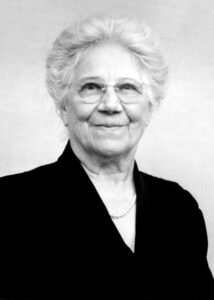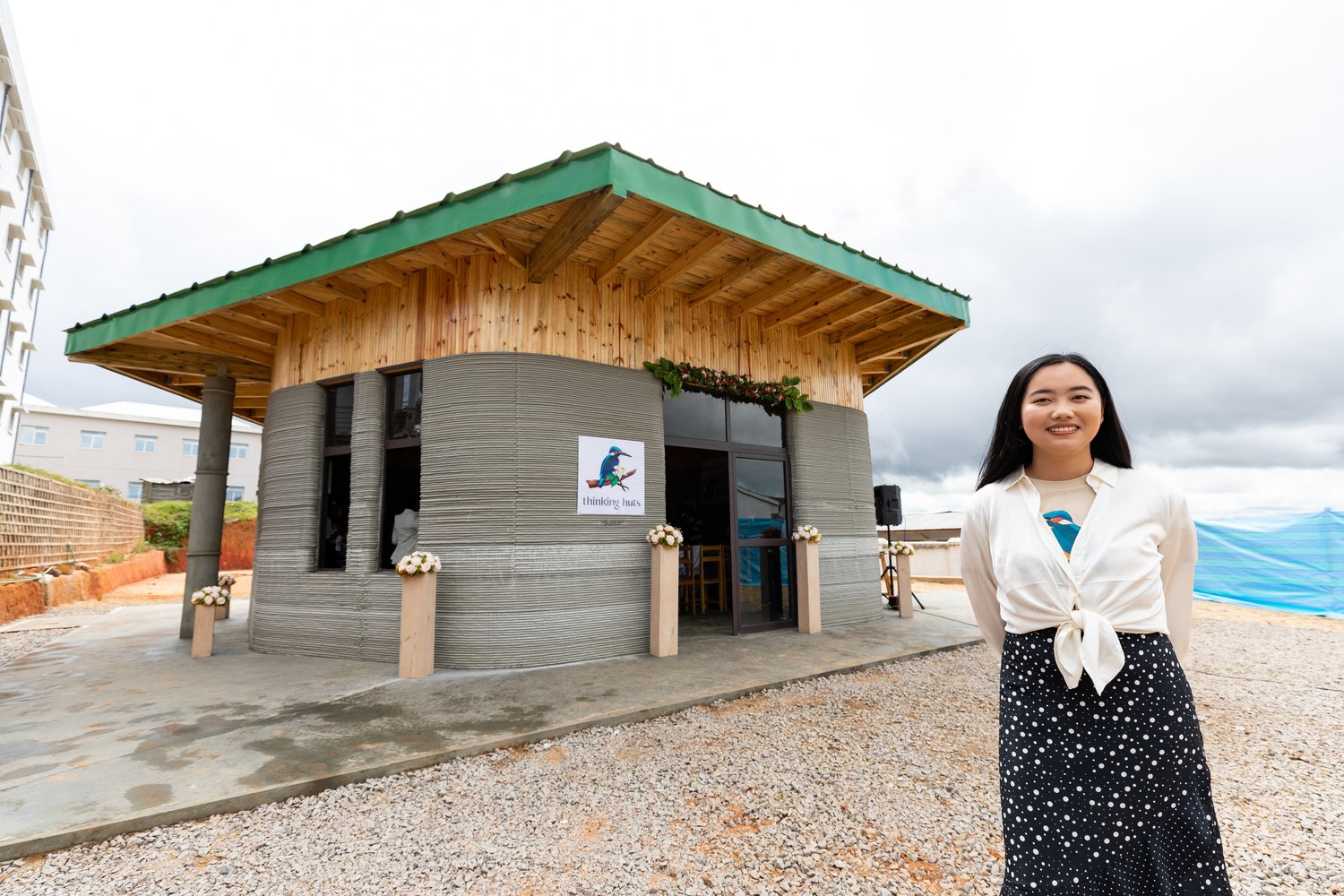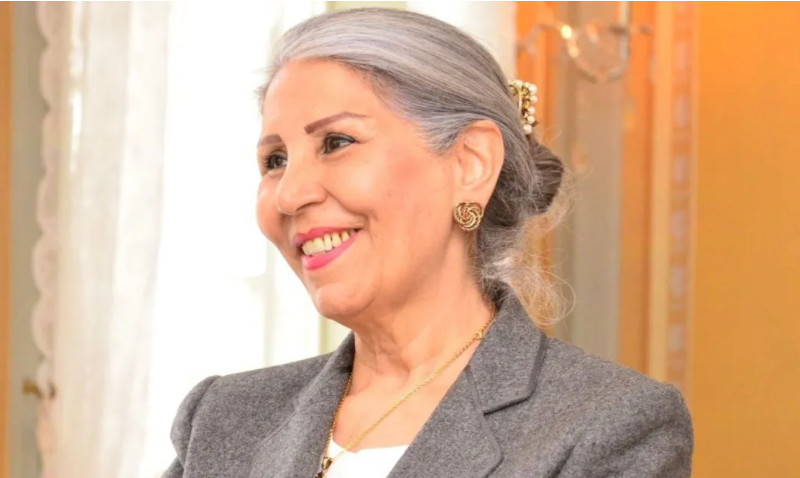 The very first time I heard of Amelia Collins was when I was a child, maybe five or six, visiting the Holy Land with my family. We were walking along the wide path in Bahji, the only sound our footsteps on the white pebbles, and before us towered a beautiful wrought-iron gilded gate, leading to the Shrine of Baha’u’llah.
The very first time I heard of Amelia Collins was when I was a child, maybe five or six, visiting the Holy Land with my family. We were walking along the wide path in Bahji, the only sound our footsteps on the white pebbles, and before us towered a beautiful wrought-iron gilded gate, leading to the Shrine of Baha’u’llah.
‘This is the ‘Collins Gate’’, my mother whispered to me. ‘Named after Amelia Collins.’
In my child’s mind’s eye, Amelia Collins too, was a figure who towered above me like this enormous gate. When I finally saw photos of her, it surprised me that, as described by Hand of the Cause Mr Abu’l-Qasim Faizi, she was, in fact, quite small – ‘a slender, white-haired, very upright, elderly lady.’ 1 When I began to read about her life, however, I realised that this incredible woman was, indeed, like this gate: strong, upright and truly a spiritual giant. Mr Faizi goes on to describe the gate itself as standing ‘silently…as a loving remembrance of the one who adored the Guardian of the Faith – Shoghi Effendi.’ 2
The more I read about Amelia Collins, the more I found that her life was truly one that was based on immense love and profound devotion to the Guardian. As she herself explained:
Out of the immense treasury of all the Writings, I memorised one sentence and did my utmost to follow that one injunction. It served as a lamp of guidance, shedding light on the dark and obscure paths of my life. That phrase is from the Will and Testament of the Master, where He says that the friends should make Shoghi Effendi happy. Whatever step I took in my life, any vote cast in the Assemblies, any trip taken, even any thought, I would first ask myself whether my vote, words, trip or thought would make him happy. When I was sure, then I would take action without fear. 2
Milly, as she was called by the Guardian, and by all those close to her, was born on 7 June, 1873 in Pittsburgh, Pennsylvania. With nine brothers and four sisters, she was born seventh in a family of fourteen. Her father was a Lutheran clergyman and she grew up in a religious and strict household, although she is described as possessing a ‘naturally strong character’ 3 and often stood up to her father. As a young woman, she married Thomas Collins, and together they lived in Michigan before moving to Arizona and then to California. It was through Nellie Stevison French that Ms Collins first learned of the Baha’i Faith, and she became a Baha’i in 1919.
Mr Faizi describes how Ms Collins’ first Baha’i friends in America had told her to write to Abdu’l-Baha and beg for confirmation and strength. He recounts:
The night she heard this, she could hardly sleep. Till morning she was contemplating how one should write to such an immensely great Personage. At last she scribbled something, and at dawn she opened the curtains of her room, as if for the first time she saw the sun shining in all its splendour and glory, giving light and life to all things in the universe. She thought to herself, the Sun shines on the world and all that is therein with such grandeur and liberality; does it need a letter? Does He expect us to appeal to Him? The sun shines in the solar system and never needs any such superficial means of communication. Then she tore up [the] letter, and in her heart she was certain that the spirit of the beloved Master, Abdu’l-Baha, also would shine upon the world of human beings and grant them faith and love. Like the sun, He had all under His care and protection there was no need to bother him with inadequate words and supplications. She said that days passed. Then, lo and behold, she received a tablet from the Master. She never showed me that tablet. She did not at first show it to anyone. It was a secret between the Lover and the loved one, and was sanctified from any kind of attention. The only part she revealed to us was this, that the Master addressed her as ‘lady of the Kingdom’. But we now know that in that tablet He stated His ‘hope’ that she would be confirmed to ‘erect a structure that shall eternally remain firm and unshakeable’. 1
Although, as Ms Collins explained, her husband Thomas ‘never became a Baha’i in this world,’ she also describes how during their pilgrimage in 1923, Thomas ‘became so enthralled with love for the Guardian, that one day, while looking at the new and uncompleted building of the Western Pilgrim House, he […] exclaimed, “How can the Baha’is see an unfinished building every day in front of the Guardian’s eyes? You will see that the building is brought to completion.”’ 2
Indeed, although Ms Collins herself lived very simply, during her lifetime she made immensely generous contributions to the funds of the Faith. Whilst the names and amount of contributions given to the Baha’i funds are private, and contributions are never given with the expectation of recognition, historical records show us the vastness of Ms Collins’ generosity and her detachment from wealth. According to Mr Faizi, ‘Her whole aim and purpose was to see her beloved [Shoghi Effendi] happy and relieved of cares. And when she took a step, she never expected, or wanted, to receive acknowledgement and praise, much less any public announcement.’ 2
Amelia Collins’ travels for the Baha’i Faith at the request of the Guardian were extensive. Amongst her many travels was a journey to Iceland in 1924, as the first Baha’i to visit that country. There she met Holmfriður Árnadottir, who became the first Icelandic Baha’i. In 1945, Ms Collins was invited by Ms Árnadottir to come to Iceland. In response, the Guardian replied through his secretary, that ‘he feels your presence in America more important than Iceland at this time…’ Ms Collins was the first to share the teachings of Baha’u’llah with indigenous peoples in the United States in accordance with Abdu’l-Baha’s Tablets of the Divine Plan, and, in 1948, the first Local Spiritual Assembly comprising indigenous peoples was formed on the Omaha Indian Reservation at Macy, Nebraska.
In January 1951, Shoghi Effendi appointed Amelia Collins as the vice-president of the International Baha’i Council, and she moved to Haifa to serve and lived there for the remainder of her life.
In December of that year, the Guardian also appointed the First Contingent of the Hands of the Cause, which included Ms Collins. It is interesting to note, however, that the Guardian had actually appointed her to this station several years earlier, though he did not then publicise her appointment. And one wonders at her own humility in never sharing this news with anyone until the announcement was made.
In 1947 the Guardian wrote to her:
The high rank you now occupy, and which no Baha’i since the Master’s passing has ever held in his own lifetime has been conferred solely in recognition of the manifold services you have already rendered, and is, by no means, intended to be a stimulus or encouragement in the path of service. Indeed the character of this latest and highly significant service you have rendered places you in the category of the Chosen Nine who, unlike the other Hands of the Cause, are to be associated directly and intimately with the cares and responsibilities of the Guardian of the Faith. I feel truly proud of you, am drawn closer to you, and admire more deeply than ever before the spirit that animates you… 2
In those heart-breaking and eventful days and years after the passing of the Guardian, Mr Faizi says that, ‘Milly’s will, determination and absolute certainty of the ultimate victory of the Cause were a great comfort, support and guiding light to her co-workers.’ 2
One of Ms Collins’ last acts of service to the Cause was, despite her frail health and excruciating pain as a result of arthritis, her attendance at the annual meeting of the Hands of the Cause. Mr Faizi writes:
She attended the meeting of the Hands held in the Mansion at Bahji, and even though she had to be carried to the upper floor in a chair, spoke with great conviction and strength, showering her abounding love upon all her co-workers. At the end of the meeting we all entered the Shrine of Baha’u’llah for praise and thanksgiving. She recited a prayer every word of which took wings to the Abha kingdom. It was very evident that this was the last act in her heroic and dramatic life. 2
Amelia Collins passed away on the afternoon of 1 January, 1962, at the age of 91. In her last earthly moments she was held within the embrace of her beloved Amatu’l-Baha Ruhiyyih Khanum, whom Ms Collins had always showered with prayers, assurances of confidence and a deep motherly love.
Many years after I first heard of Amelia Collins, I came across Mr Faizi’s recollection of Ms Collins’ explanation of her own personal relationship with that gate, and, perhaps, more significantly, with the Guardian:
Ever since my childhood I had wanted a gate. Even when I was very small and used to build little houses for my dolls, I will try to make a gate for the doll’s house. I used little bars of iron and other scraps, but none satisfied my longing.
When we built a home in New England, Tom asked me about a gate. I said to him, ‘Tom, I do not want to put the money into a gate now.’ But nothing could satisfy that deep longing of mine.
About this time I embraced the Faith and forgot about this desire of mine. I had no thought any more for worldly things.
After my husband died and I had been called to Haifa to serve, I offered the beloved Guardian a contribution and expressed the hope that the sum be used for his personal needs.
Time passed and one day I received a letter from Shoghi Effendi. It contained a photograph of a gigantic and very beautiful gate and a note asking me how I liked it, and informing me that it had been purchased with the money I had offered him! Immediately I sent a message to him, saying, ‘Exceedingly beautiful!’
One night when some pilgrims were present at the table in the western pilgrim house, William Foster was among them. In his love for the Guardian he expressed the wish to be of some service while he was on pilgrimage; he was a builder and contractor by profession. The beloved asked him if he could build a gate, and Bill replied, with the greatest delight, that he most certainly could.
The Guardian then said he planned to erect the Collins gate in the Haram-i-Aqdas. 2
Mr Faizi says that this was the first time that Amelia Collins heard this expression: ‘At that tender moment as she gazed at the beloved Guardian, the sign of God on Earth, who knew her inmost longing, Milly told us: “He knew that my life has no worth except to offer it at his bidding at any moment. He responded to my look with a heavenly smile.”’ 2
FOOTNOTES & CITATIONS
- Faizi, A. Milly. A Tribute to the Hand of the Cause of God, Amelia E. Collins. George Ronald, 1977
- Ibid.
- Whitehead, OZ. Portraits of Some Baha’i Women. George Ronald, 1996. p73




